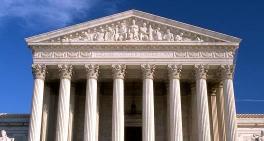Supreme Court allows Arkansas to enforce abortion restrictions
Law Journal
The Supreme Court is allowing Arkansas to put into effect restrictions on how abortion pills are administered. Critics of a challenged state law say it could effectively end medication abortions in the state.
The justices did not comment Tuesday in rejecting an appeal from the Planned Parenthood affiliate in Arkansas that asked the court to review an appeals court ruling and reinstate a lower court order that had blocked the law from taking effect. The law says doctors who provide abortion pills must hold a contract with another physician who has admitting privileges at a hospital and who would agree to handle complications.
The law is similar to a provision in Texas law that the Supreme Court struck down in 2016. The U.S. 8th Circuit Court of Appeals reversed the court order barring enforcement of the law, but put its ruling on hold while Planned Parenthood appealed to the Supreme Court.
The legal fight over the law is not over, but the state is now free to enforce it, at least for the time being. Planned Parenthood has said that if the law stands, Arkansas would be the only state where women would not have access to a pair of drugs that end pregnancies: mifepristone, which makes it difficult for a fetus to attach to the uterine wall, and misoprostol, which causes the body to expel it, similar to a miscarriage.
The organization offers pills to end pregnancies at clinics in Fayetteville and Little Rock but says it cannot find any Arkansas obstetrician willing to handle hospital admissions. Preventing women from obtaining medication abortions would create an undue burden on their right to an abortion, Planned Parenthood says. Undue burden is the standard set by the Supreme Court to measure whether restrictions go too far in limiting women who want an abortion.
Related listings
-
Court allows Pennsylvania to redraw GOP-favored district map
Law Journal 02/05/2018Justice Samuel Alito, who handles emergency appeals from Pennsylvania, rejected the request from GOP legislative leaders and voters to put on hold an order from the state Supreme Court intended to produce new congressional districts in the coming two...
-
Judge to pick battlefield for court fight over Manson's body
Law Journal 01/06/2018Charles Manson orchestrated murders in his adopted hometown of Los Angeles, served time in a state prison in Corcoran and died in a hospital in Bakersfield.The legal battle for his body or possessions could land in any of three California counties wh...
-
Court gives government a win in young immigrants' cases
Law Journal 10/24/2017A federal appeals court handed the U.S. government a victory Tuesday in its fight against lawsuits opposing a decision to end a program protecting some young immigrants from deportation.The 2nd U.S. Circuit Court of Appeals in Manhattan directed Broo...

Grounds for Divorce in Ohio - Sylkatis Law, LLC
A divorce in Ohio is filed when there is typically “fault” by one of the parties and party not at “fault” seeks to end the marriage. A court in Ohio may grant a divorce for the following reasons:
• Willful absence of the adverse party for one year
• Adultery
• Extreme cruelty
• Fraudulent contract
• Any gross neglect of duty
• Habitual drunkenness
• Imprisonment in a correctional institution at the time of filing the complaint
• Procurement of a divorce outside this state by the other party
Additionally, there are two “no-fault” basis for which a court may grant a divorce:
• When the parties have, without interruption for one year, lived separate and apart without cohabitation
• Incompatibility, unless denied by either party
However, whether or not the the court grants the divorce for “fault” or not, in Ohio the party not at “fault” will not get a bigger slice of the marital property.




